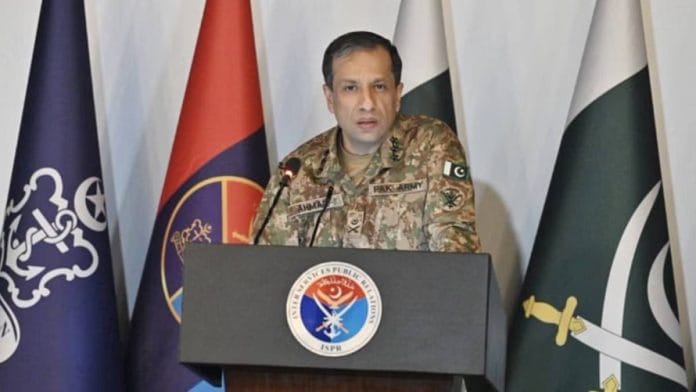New Delhi: Pakistan will strike ‘deeper within India’ and “start from the east” if India were to carry out any military action along the lines of Operation Sindoor in the future, director general of Pakistan military’s media wing told The Economist, according to a report published Sunday. Lt Gen Ahmed Sharif Chaudhry, spokesman for the Inter-Services Public Relations (ISPR), also downplayed speculation that Pakistan’s army chief Field Marshal Asim Munir harbours any political ambitions or that his ideological bent is more stark than that of his predecessors.
Asked how Pakistan would respond to any future Indian military action, given Indian Prime Minister Narendra Modi’s assertion that terror attacks would be met with decisive force, Chaudhry added, “They also need to understand that they can be hit everywhere.”
The remarks come amid heightened tensions between the two countries following the Pahalgam terror attack and India’s response in the form of Operation Sindoor launched by Indian armed forces on 7 May. The pre-dawn operation targeted nine terror camps in Pakistan and Pakistan-occupied Kashmir. This was in response to the massacre in Pahalgam where terrorists, suspected to be linked to Laskhar-e-Taiba (LeT) front The Resistance Front (TRF), killed 25 Indian men on 22 April after identifying them by their religion.
As ThePrint reported earlier, Pakistan, which initially turned down the request of Indian DGMO Lt Gen Rajiv Ghai on 7 May “with an intimation that a severe response was inevitable and in the offing,” reached out to him on 10 May to propose cessation of hostilities.
India has made it clear that any terrorist attack on its soil will be met with a strong and calibrated response. Such action will be taken on its own terms and timeline, with all locations linked to terror operations including training camps and other facilities subject to precise targeting.
Furthermore, it has been reiterated on multiple platforms that there will be no tolerance for nuclear blackmail with the response being deliberate and exact. Moreover, no distinction will be made between those who execute acts of terrorism and the state that sponsors or protects them.
Chaudhry’s comments also appear in the context of what The Economist describes as Field Marshal Munir’s “grip on power” which it said may have increased since May.
The Pakistani military spokesman further underlined that Munir’s controversial speech on 16 April, just six days before the Pahalgam attack, reflected his personal beliefs. “He was saying what he stands for, what he is ready to die for,” Chaudhry said.
In the speech, Munir revived the ‘two-nation theory’ and called Kashmir the “jugular vein” of Pakistan. “We are two nations, not one,” he declared. “Our forefathers thought we are different from Hindus in every possible aspect of life—our religions, customs, traditions, thoughts and ambitions.” He added that “no power in the world” could separate Kashmir from Pakistan.
In his conversation with The Economist, Chaudhry further dismissed talks that Munir harbours political ambitions, calling suggestions of a presidential bid “nonsense”. He rejected the notion that Munir is more ideological than his predecessors, describing him instead as someone “well-versed with the West” and “resolutely opposed” to jihadist groups operating within Pakistan.
(Edited by Amrtansh Arora)







Lieutenant General Ahmed Sharif Chaudhry, the Director General of Pakistan’s Inter-Services Public Relations (ISPR), is the son of Sultan Bashiruddin Mahmood, who is designated as a terrorist by the United Nations Security Council’s al-Qaida Sanctions Committee. Mahmood, a former nuclear scientist, was sanctioned in December 2001 for his ties to al-Qaida and the Taliban, specifically for providing information about nuclear, chemical, and biological weapons to Osama bin Laden through his organization, Ummah Tameer-e-Nau (UTN). The UN listing cites his meetings with bin Laden and al-Qaida leaders in Afghanistan, where he discussed weapons technology, raising concerns about nuclear proliferation.
Lt Gen Ahmed Sharif Chaudhry happens to be the spokesman for the Inter-Services Public Relations (ISPR). While his father happens to be an UN designated terrorist.
Am sure The Economist journalist never bothered to ask Chaudhry about his father and the kind of upbringing he has had.
The same media organisation casts aspersions on Narendra Modi, Amit Shah and other Indian right-wing political leaders.